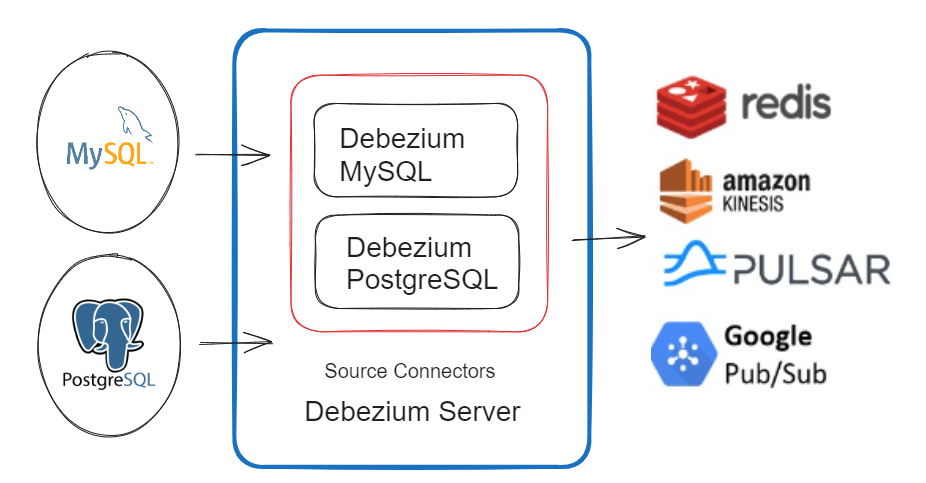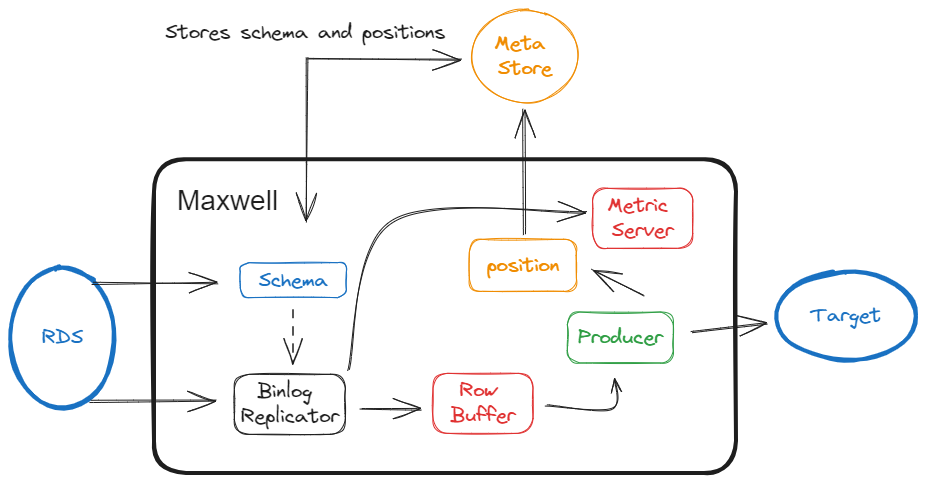Explore our expert-made templates & start with the right one for you.
Debezium vs Maxwell: Detailed Comparison of Open-source CDC Tools
If you’re specifically interested in Debezium, we have prepared a thorough technical guide: “Debezium for CDC: Benefits, Pitfalls, and Alternatives.” This comprehensive paper explores the core principles of Debezium, its capabilities and limitations, and how to achieve scalable CDC pipelines with minimal engineering overhead. You can download this technical guide for free here.
Change Data Capture (CDC) is not a new concept and has been integral to database and data warehouse management for decades. At its core, CDC involves software processes that track and identify changes in data from a defined point in time. This changed data is then replicated to another system, such as a data warehouse, enabling enterprises to act upon those changes. Instead of processing an entire dataset, focusing on just the altered data enhances efficiency. This approach conserves system resources needed for data acquisition and speeds up the retrieval of actionable data.
Open-source CDC tools like Debezium and Maxwell offer flexibility, cost-effectiveness, and community-driven enhancements. Yet, choosing the right open-source CDC tool requires careful consideration of various factors. In this article, we explore Debezium and Maxwell, two leading open-source CDC tools, discussing their pros and cons to help you make an informed decision for your data synchronization needs.
Overview of Debezium
Debezium is an open-source distributed platform for change data capture. It captures row-level changes to a database table and passes them onto downstream applications in near real-time. Debezium is designed to be highly scalable and robust, offering a wide range of connectors for different database systems such as MySQL, PostgreSQL, MongoDB, and others. Its ability to seamlessly integrate with Kafka makes it a preferred choice for many organizations seeking efficient data replication and microservices architectures.
For a deeper technical overview of Debezium, download our free technical guide.

Overview of Maxwell
Maxwell is another open-source tool that provides CDC capabilities. It reads MySQL binlogs and produces row updates as JSON to Kafka, Kinesis, or other streaming platforms. Maxwell is known for its simplicity and ease of setup. It stands out for its minimalistic design and lightweight architecture, making it an excellent option for smaller-scale applications or teams with limited resources.

Feature Comparison: Debezium vs Maxwell
When comparing Debezium and Maxwell, several key features stand out:
- Ease of Setup: Maxwell is often praised for its straightforward setup process, whereas Debezium requires more configuration, particularly when integrating with Kafka.
- Performance and Scalability: Debezium excels in large-scale deployments, offering robust performance and scalability. Maxwell, while efficient, is better suited for smaller to medium-sized applications.
- Supported Databases: Debezium supports a wider range of databases compared to Maxwell, which primarily focuses on MySQL.
- Customization and Flexibility: Debezium offers more customization options, making it a versatile choice for complex data architectures.
Use Cases and Application Scenarios
Debezium shines in large-scale, complex environments where robustness and scalability are paramount. It’s well-suited for enterprises with diverse database systems and those implementing microservices architectures.
On the other hand, Maxwell is ideal for startups and smaller organizations that require a simple, easy-to-implement CDC solution for MySQL databases. It’s particularly beneficial for applications where lightweight architecture is a priority.
Pros and Cons of Debezium
Pros:
- Broad Database Compatibility: Debezium supports a wide range of databases including MySQL, PostgreSQL, MongoDB, and Oracle. This makes it an excellent choice for organizations that work with multiple database technologies.
- High Scalability: It is designed for high-volume data environments and can handle large amounts of data changes efficiently, making it ideal for enterprise-scale deployments.
- Robust Feature Set: Debezium offers advanced features like snapshots, schema changes tracking, and more. These features are crucial for comprehensive data synchronization and integrity.
- Kafka Integration: Its seamless integration with Apache Kafka allows for robust data streaming and processing capabilities, making it suitable for complex data pipelines and microservices architectures.
- Strong Community and Support: Being an open-source tool, Debezium has a strong community support system, which includes comprehensive documentation, active forums, and regular updates.
Cons:
- Complex Setup and Configuration: Debezium’s advanced features and capabilities come with a complexity in setup and configuration, which might be challenging for teams with less expertise in Kafka or CDC.
- Resource Intensive: Due to its robust nature, Debezium can be resource-intensive, requiring more substantial infrastructure and maintenance, especially in large-scale deployments.
- Learning Curve: The tool has a steeper learning curve, particularly for users who are not familiar with Kafka and its ecosystem.
Pros and Cons of Maxwell
Pros:
- Ease of Use and Setup: Maxwell is known for its simplicity and ease of setup, especially appealing for teams with limited resources or those starting with CDC.
- Lightweight Architecture: It has a minimalistic design that is less resource-intensive, making it a good fit for smaller applications or where infrastructure resources are a concern.
- Real-time Data Streaming: Maxwell efficiently streams row-level changes as JSON to Kafka, Kinesis, or other platforms, enabling real-time data processing.
- Good for MySQL Focused Environments: Maxwell is particularly efficient for MySQL databases, making it a go-to choice for environments predominantly using MySQL.
Cons:
- Limited Database Support: Unlike Debezium, Maxwell primarily supports MySQL, which can be a limiting factor for organizations using a variety of database technologies.
- Less Scalable for Large Enterprises: While efficient, Maxwell may not be as scalable as Debezium for handling very high volumes of data changes, which could be a drawback for larger enterprises.
- Fewer Features Compared to Debezium: Maxwell’s simplicity also means it has fewer advanced features compared to Debezium, which might be a limitation for complex data synchronization needs.
Community and Support
Both Debezium and Maxwell have active communities and comprehensive documentation. They offer support through community forums, GitHub issues, and extensive documentation.
Conclusion and Recommendations
In conclusion, the choice between Debezium and Maxwell largely depends on your specific needs and scale of operation. For large-scale, complex deployments with diverse database systems, Debezium is the superior choice. However, for smaller applications or teams requiring a straightforward, lightweight CDC tool for MySQL, Maxwell is more suitable.
Both Debezium and Maxwell offer unique advantages. By understanding your project’s specific requirements, you can choose the most appropriate tool to streamline your data integration and processing needs.

